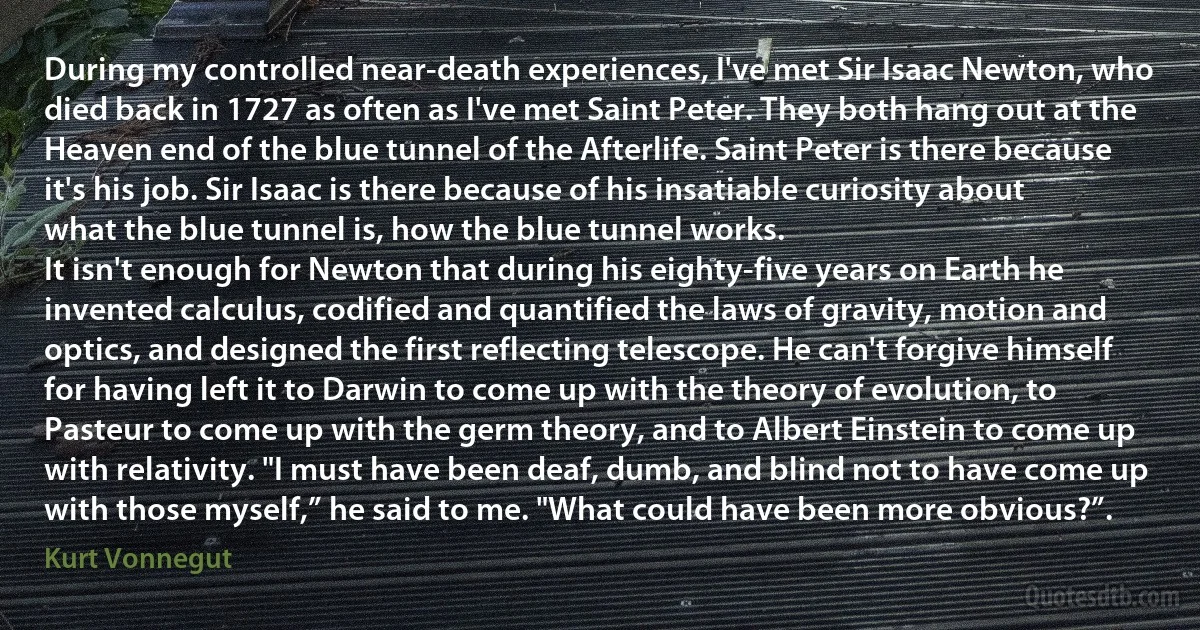
During my controlled near-death experiences, I've met Sir Isaac Newton, who died back in 1727 as often as I've met Saint Peter. They both hang out at the Heaven end of the blue tunnel of the Afterlife. Saint Peter is there because it's his job. Sir Isaac is there because of his insatiable curiosity about what the blue tunnel is, how the blue tunnel works. It isn't enough for Newton that during his eighty-five years on Earth he invented calculus, codified and quantified the laws of gravity, motion and optics, and designed the first reflecting telescope. He can't forgive himself for having left it to Darwin to come up with the theory of evolution, to Pasteur to come up with the germ theory, and to Albert Einstein to come up with relativity. "I must have been deaf, dumb, and blind not to have come up with those myself,” he said to me. "What could have been more obvious?”.
Kurt VonnegutRelated topics
blind calculus control deaf earth end enough evolution germ hang having heaven job left met optics reflecting relativity saint say telescope works years afterlife einstein laws pasteur newton darwin isaacRelated quotes
We must be prepared to accept the will of God. The Lord permits all sorts of things to happen to us contrary to our will, for if we always have it our way, we will not be prepared for the Kingdom of Heaven. Neither heaven nor earth will receive those who are self-willed.
God has a Divine plan for each one of us, and we must submit to His plan. We must accept life as it is given to us, without asking, "Why me?” We must know that nothing on earth or in heaven ever happens without the will of God or His permission. We must not become too engrossed with our hardships but concentrate on preserving our inner peace.
Even when we are praying for something, we are trying to force our will instead of accepting God's. All hardships and sorrows that God sends us are necessary for us, but we do not understand this when we are young. When we are older, then we understand that this is the way God shows His love for us.

Tadej of Vitovnica
Just say "mister I'm sorry, I got no time to die, I'm too busy" and then turn and run like hell. If they say coward why don't pay any attention because it's your job to live not to die. If they talk about dying for principles that are bigger than life, you say "mister you're a liar. Nothing is bigger than life". There's nothing noble in death. What's noble about lying in the ground and rotting? What's noble about never seeing the sunshine again? What's noble about having your legs and arms blown off? What's noble about being an idiot? What's noble about being blind and deaf and dumb? What's noble about being dead? Because when you're dead, mister, it's all over. It's the end. You're less than a dog, less than a rat, less than a bee or an ant, less than a white maggot crawling around on a dungheap. You're dead, mister, and you died for nothing.

Dalton Trumbo
Had it merely called to our attention the existence and exact nature of certain fundamental gaps in economic theory, the Theory of Economic Behavior by von Neumann and Morgenstern would have been a book of outstanding importance. But it does more than that. It is essentially constructive: where existing theory is considered to be inadequate, the authors put in its place a highly novel analytical apparatus designed to cope with the problem.
It would be doing the authors an injustice to say that theirs is a contribution to economics only. The scope of the book is much broader. The techniques applied by the authors in tackling economic problems are of sufficient generality to be valid in political science, sociology, or even military strategy. The applicability to games proper (chess and poker) is obvious from the title. Moreover, the book is of considerable interest from a purely mathematical point of view.

Leonid Hurwicz
THEY who are acquainted with the present state of the theory of Symbolical Algebra, are aware, that the validity of the processes of analysis does not depend upon the interpretation of the symbols which are employed, but solely upon the laws of their combination. Every system of interpretation which does not affect the truth of the relations supposed, is equally admissible, and it is thus that the same process may, under one scheme of interpretation, represent the solution of a question on the properties of numbers, under another, that of a geometrical problem, and under a third, that of a problem of dynamics or optics. This principle is indeed of fundamental importance; and it may with safety be affirmed, that the recent advances of pure analysis have been much assisted by the influence which it has exerted in directing the current of investigation.

George Boole
Personally, I never met Knut Wicksell. I saw him once when he delivered a lecture in Oslo, but being an unassuming student at the time, I did not have the courage to talk to him. So my knowledge of his theory came only through his writings. That, however, was a very intense and absorbing form of making his acquaintance. Already from my early student days, I read his writings (in German and Swedish) avidly. And I continued to do so later.
When I started my study on Wicksell, I found that his works were not easy reading. Often it was only at the third or fourth reading that I grasped his ideas. Invariably, each new reading made me more and more enthusiastic. Sometimes it happened that I thought I had finally caught him in an inconsistency or in unclear thinking. Every time this happened, it turned out, however, that the error was mine.

Ragnar Frisch
